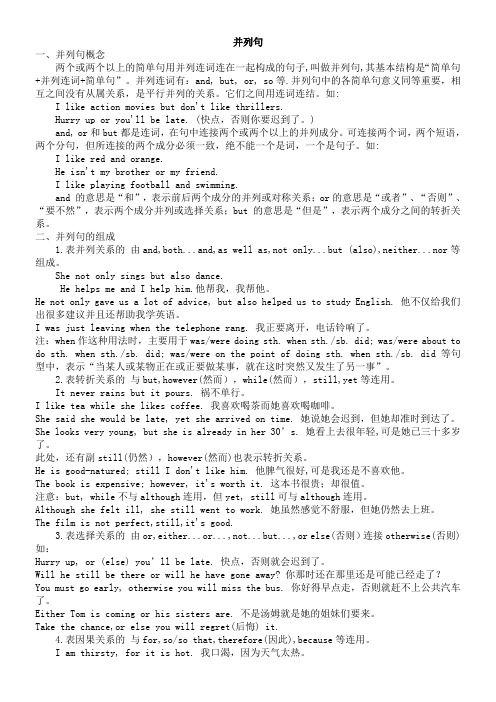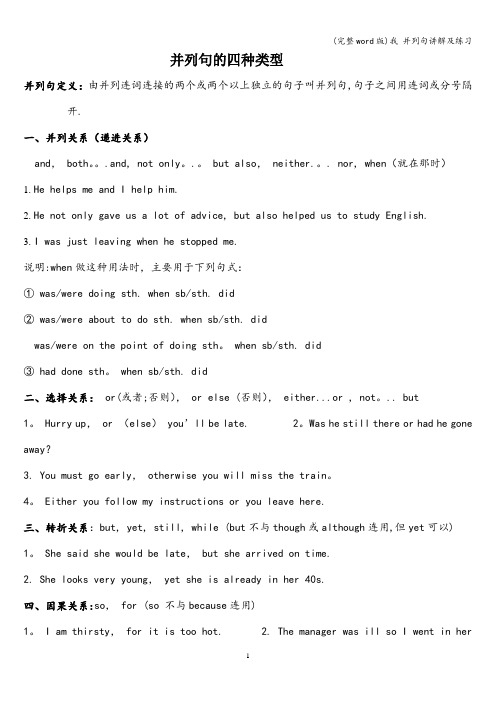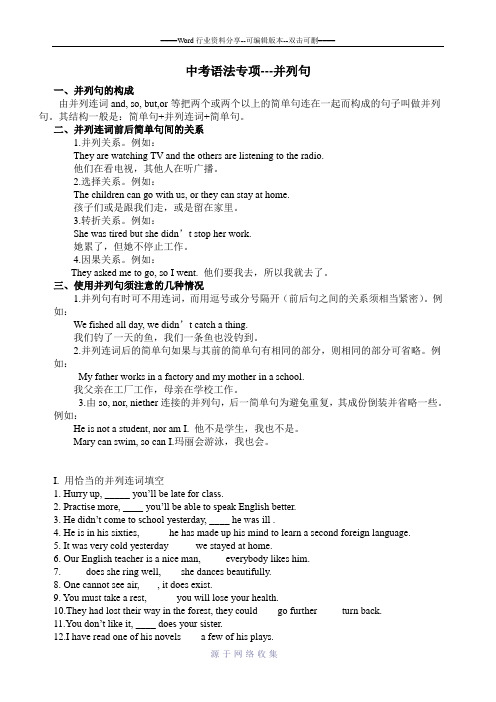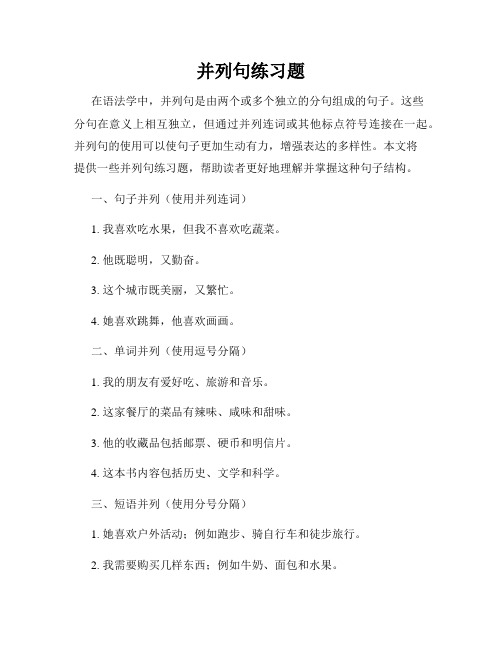初中并列句讲解与练习
中考英语复习句子类型知识讲解与练习(并列句复合句)

中考英语句子类型知识讲与练一、并列句由两个或两个以上由并列连接词连在一起的简单句称为并列句。常用的并列连词有:1.连接两个同等概念,常用and, not only... but also..., neither... nor...等。[例]The teacher's name is Bob, and the student's name is John.老师叫鲍勃,学生叫约翰。2.表示选择,常用的连词有or, either... or...等。[例]Shall we go out to the cinema or shall we stay at home?我们是出去看电影还是留在家里?3.表示转折,常用的连词有but, yet, while等。[例]He was a little man with thick glasses, but he had a strange way of making his classes lively and interesting.他个子矮小,戴着厚厚的眼镜,但他却能用一种奇特的方法使他的课生动有趣。4.表示因果,常用的连词有so, for等。[例]August is the time of the year for rice harvest, so every day I work from dawn until dark.八月份是水稻收获的季节,因此每天我都从早忙到晚。【练习】用合适的连词填空1.Excuse me for breaking in, I have some news for you.2.He helps me do the cleaning I help him with his physics.3.The car broke down, we had to find a telephone.4.Do the job yourself ask others for help.5.It must have rained last night, the ground is wet.【答案】1.Excuse me for breaking in,but I have some news for you.2.He helps me do the cleaning and I help him with his physics.3.The car broke down,so we had to find a telephone.4.Do the job yourself or ask others for help.5.It must have rained last night,for the ground is wet.【练习】将两个简单句合并为并列句1.It has no mouth. It can talk.2.You must tell the truth. You will be punished.3.He has many good friends. He is an honest man.4.Mr. Li went to his hometown. Mr. Wang was taking his class instead.5.He wants to be a writer. I want to be a scientist.【答案】1.It has no mouth, but it can talk.2.You must tell the truth, or you'll be punished.3.He has many good friends, for he is an honest man.4.Mr. Li went to his hometown, so Mr. Wang was taking his class instead.5.He wants to be a writer while I want to be a scientist.二、复合句1.概念主从复合句由一个主句和一个或一个以上的从句构成。从句通常由关联词引导,关联词将从句和主句联系在一起。2.分类按其在复合句中的作用,分为主语从句、表语从句、宾语从句、同位语从句、定语从句和状语从句。前四种从句在复合句中的作用相当于名词,统称为名词性从句。(1)主语从句How much income we can expect this year is not yet known.我们今年能有多少收入还不知道。Who will go is not important.谁将去并不重要。(2)表语从句The answer is that he is one of the top three physicists in his particular field.答案是:在他的特殊领域里,他是三位顶尖的物理学家之一。(3)宾语从句Scientists explain that the outside of the earth is made of a number of different plates.科学家解释说,地球的表层是由许多不同的板块构成的。(4)同位语从句The hope that he may recoveris not gone yet.他会康复的希望没有消失。(5)定语从句The man who is shaking hands with my father is a policeman.正和我父亲握手的那个人是个警察。A dictionary is a book which gives the meaning of words.词典是解释词语意思的书。This is the place where my mother was born.这是我母亲出生的地方。(6)状语从句Listen and be quiet while others are talking!在别人说话时要听着,保持安静!Go back where you come from.回到你来的地方去。You can tell me if you need help.【练习】判断下列句子含有哪种从句,并用横线标出1.When you see him, please say hello to him.2.Is he the man who wants to see you?3.I want to know what he has told us.4.The fact is that we have lost the game.5.What he wants to tell us is not clear.6.While I agree with you, I can't go with you.7.He waited until I returned.8.Where there is a will, there is a way.9.I shall never forget the day when we moved into our new house.10.He hid his storybook so that his teacher couldn't find it.【答案】1.When you see him\s\do14(状语从句), please say hello to him.2.Is he the man who wants to see you\s\do14(定语从句)?3.I want to know what he has told us\s\do14(宾语从句).4.The fact is that we have lost the game\s\do14(表语从句).5.What he wants to tell us\s\do14(主语从句)is not clear.6.While I agree with you\s\do14(状语从句), I can't go with you.7.He waited until I returned\s\do14(状语从句).8.Where there is a will\s\do14(状语从句), there is a way.9.I shall never forget the day when we moved into our new house\s\do14(定语从句).10.He hid his storybook so that his teacher couldn't find it\s\do14(状语从句).【练习】指出下列句子中画线部分的句子成分1.①The_students got on the ②school bus.2.I ①shall_answer your question ②after_class.3.What a beautiful Chinese painting!4.Tom came to_ask_me_for_advice.5.He found ①it important ②to_master_English.6.Do you have ①anything else ②to_say?7.He became a_teacher at the age of twentyone.8.Would you please tell me_your_address?9.①It is ②our_duty to keep our classroom ③clean_and_tidy.10.We must keep it a_secret.【答案】1.①主语②定语2.①谓语②状语3.定语4.状语5.①形式宾语②真正宾语6.①宾语②定语7.表语8.宾语(间宾+直宾)9.①形式主语②表语③宾补10.宾补【练习】判断下列句子是简单句、并列句还是复合句1.We often study Chinese history on Friday afternoon.2.The boy who offered me his seat is called Tom.3.There is a chair in this room, isn't there?4.My brother and I go to school at half past seven in the morning and come back home at seven in the evening.5.He is in Class One and I am in Class Two.6.He was fond of drawing when he was a child.7.Neither has he changed his mind, nor will he do so.8.What he said at the meeting is very important, isn't it?9.Both Tom and Jack enjoy country music.【答案】1.简单句2.复合句3.简单句4.简单句5.并列句6.复合句7.并列句8.复合句9.简单句【练习】汉译英。。。。。很生气。7.这就是我们去年冬天住过的房间吗?8.如果有时间,我们星期三来看你。【答案】1.Onethird of the students in this class are girls.2.She takes good care of her sick mother.3.He looks a bit excited.4.Their plan is to finish the experiment in a week.5.They helped the old with their housework yesterday.6.What he said made me very angry.7.Is this the room where we lived last winter?8.We will come over to see you on Wednesday if we have time.。
并列句及练习

并列句一、并列句概念两个或两个以上的简单句用并列连词连在一起构成的句子,叫做并列句,其基本结构是“简单句+并列连词+简单句”。
并列连词有:and, but, or, so等.并列句中的各简单句意义同等重要,相互之间没有从属关系,是平行并列的关系。
它们之间用连词连结。
如:I like action movies but don't like thrillers.Hurry up or you'll be late. (快点,否则你要迟到了。
)and, or和but都是连词,在句中连接两个或两个以上的并列成分。
可连接两个词,两个短语,两个分句,但所连接的两个成分必须一致,绝不能一个是词,一个是句子。
如:I like red and orange.He isn't my brother or my friend.I like playing football and swimming.and 的意思是“和”,表示前后两个成分的并列或对称关系;or的意思是“或者”、“否则”、“要不然”,表示两个成分并列或选择关系;but 的意思是“但是”,表示两个成分之间的转折关系。
二、并列句的组成1.表并列关系的由and,both...and,as well as,not only...but (also),neither...nor等组成。
She not only sings but also dance.He helps me and I help him.他帮我,我帮他。
He not only gave us a lot of advice, but also helped us to study English. 他不仅给我们出很多建议并且还帮助我学英语。
I was just leaving when the telephone rang. 我正要离开,电话铃响了。
注:when作这种用法时,主要用于was/were doing sth. when sth./sb. did; was/were about to do sth. when sth./sb. did; was/were on the point of doing sth. when sth./sb. did等句型中,表示“当某人或某物正在或正要做某事,就在这时突然又发生了另一事”。
(完整word版)我 并列句讲解及练习

并列句的四种类型并列句定义:由并列连词连接的两个或两个以上独立的句子叫并列句,句子之间用连词或分号隔开.一、并列关系(递进关系)and, both。
.and, not only。
.。
but also, neither.。
. nor, when(就在那时)1.He helps me and I help him.2.He not only gave us a lot of advice, but also helped us to study English.3.I was just leaving when he stopped me.说明:when做这种用法时,主要用于下列句式:① was/were doing sth. when sb/sth. did② was/were about to do sth. when sb/sth. didwas/were on the point of doing sth。
when sb/sth. did③ had done sth。
when sb/sth. did二、选择关系:or(或者;否则), or else (否则), either...or , not。
.. but1。
Hurry up, or (else) you’ll be late. 2。
Was he still there or had he gone away?3. You must go early, otherwise you will miss the train。
4。
Either you follow my instructions or you leave here.三、转折关系:but, yet, still, while (but不与though或although连用,但yet可以)1。
She said she would be late, but she arrived on time.2. She looks very young, yet she is already in her 40s.四、因果关系:so, for (so 不与because连用)1。
并列句的连接词与运用初中语法详解

并列句的连接词与运用初中语法详解在学习语文的过程中,我们经常会遇到并列句。
并列句是指两个或多个句子并列在一起表达同一种意思的句子。
而在使用并列句的时候,我们需要用到连接词来对这些句子进行连接。
本文将详细解释并列句的连接词以及初中语法中的运用。
一、常见的并列句连接词1. 并列连词:用于连接两个句子,并且这两个句子在意义上没有主次之分。
常见的并列连词有"和"、"与"、"同"、"并"等。
例如:他喜欢打篮球,和足球也很喜欢。
2. 逗号:逗号在连接并列句时的作用与并列连词相似,但它通常常用于连接短句,或者句子成分比较短小的情况。
例如:他喜欢打篮球,足球,乒乓球。
3. 并列副词:用于连接两个句子,并且这两个句子在意义上有主次之分。
常见的并列副词有"虽然"、"但是"、"然而"等。
例如:虽然天气很冷,但是他还是去跑步了。
4. 即或连词:即或连词用于连接两个或多个对等的词、短语或从句。
它的作用是表示选择的关系。
例如:你可以选择跳舞,或者唱歌。
二、并列句的运用并列句的运用在写作中非常常见。
它可以使句子更加简洁明了,也可以使得句子之间的逻辑关系更为清晰。
1. 并列句的意义相近或者呼应关系例如:她喜欢唱歌,跳舞更是她的拿手好戏。
2. 并列句的对比或者转折关系例如:他既喜欢读书,又喜欢运动。
3. 并列句的选择关系例如:他可以选择留在家里看电视,也可以选择出去散步。
4. 并列句的因果关系例如:他每天都早起,所以他的身体非常健康。
5. 并列句的列举关系例如:他喜欢吃水果,蔬菜,肉类等各种食物。
总结:通过以上的详细解释,我们可以看出并列句的连接词对于并列句的运用非常重要。
在初中语法中,我们需要了解并掌握这些连接词的用法,以便在写作或者阅读中更好地理解句子的意义。
同时,在运用并列句时,我们也需要注意句子之间的逻辑关系,以确保语言表达的准确性。
中考语法专项--并列句

中考语法专项---并列句一、并列句的构成由并列连词and, so, but,or等把两个或两个以上的简单句连在一起而构成的句子叫做并列句。
其结构一般是:简单句+并列连词+简单句。
二、并列连词前后简单句间的关系1.并列关系。
例如:They are watching TV and the others are listening to the radio.他们在看电视,其他人在听广播。
2.选择关系。
例如:The children can go with us, or they can stay at home.孩子们或是跟我们走,或是留在家里。
3.转折关系。
例如:She was tired but she didn’t stop her work.她累了,但她不停止工作。
4.因果关系。
例如:They asked me to go, so I went. 他们要我去,所以我就去了。
三、使用并列句须注意的几种情况1.并列句有时可不用连词,而用逗号或分号隔开(前后句之间的关系须相当紧密)。
例如:We fished all day, we didn’t catch a thing.我们钓了一天的鱼,我们一条鱼也没钓到。
2.并列连词后的简单句如果与其前的简单句有相同的部分,则相同的部分可省略。
例如:My father works in a factory and my mother in a school.我父亲在工厂工作,母亲在学校工作。
3.由so, nor, niether连接的并列句,后一简单句为避免重复,其成份倒装并省略一些。
例如:He is not a student, nor am I. 他不是学生,我也不是。
Mary can swim, so can I.玛丽会游泳,我也会。
I. 用恰当的并列连词填空1. Hurry up, _____ you’ll be late for class.2. Practise more, ____ you’ll be able to speak English better.3. He didn’t come to school yesterday, ____ he was ill .4. He is in his sixties, _____ he has made up his mind to learn a second foreign language.5. It was very cold yesterday_____ we stayed at home.6. Our English teacher is a nice man, ____ everybody likes him.7. ____ does she ring well, ___ she dances beautifully.8. One cannot see air, ___, it does exist.9. You must take a rest, _____ you will lose your health.10.They had lost their way in the forest, they could ___ go further ____ turn back.11.You don’t like it, ____ does your sister.12.I have read one of his novels ___ a few of his plays.II. 单项选择1.The singer is not well thought of _______ his records do not sell well.A. butB. andC. orD. while2. I want to pick up the programme, _____ I haven’t got a short-wave radio.A. forB. soC. andD. but3. Don’t tell a lie any more, _____ I won’t make friends with you.A. norB. neitherC. butD. or4. Every person wants to keep fit, ______ we need healthy foods.A. soB. andC. whileD. but5. The fire was very big, _____ the firefighters put it out in half an hour.A. butB. whileC. howeverD. yet6. They are going to return some of the milu deer to the wild, _____ their number increases year by year.A. soB. forC. therefore D and7. There are some jobs that men can do well _____ there are also some jobs that men cannot do well.A. whileB. becauseC. orD. so8. He is over forty, _______ he insists on learning another foreign language.A. andB. soC. orD. still9. Be careful when you stand on the dam. _____, you will fall into the water.A. OtherwiseB. ThereforeC. OrD. And10.They did not invite Dr Smith to the medical conference, ______ did we.A. eitherB. soC. neitherD. and11.Would you like a cup of coffee_____ shall we get down to business right away?A. andB. thenC. orD. otherwise12.Tony likes listening to music, _______he hates practising the violin.A. but C.and D. or13.Hold on to your dreams, _______ one day they may just come true.A. andB.butC.soD. or14.We are going to the bookstore. You can come with us _______you can meet us there later.A. and D.then15.Bicky caught a bad cold yesterday, _______ he had to stay at home.A. because D.so16.—I usually have milk and bread for breakfast.—__________.A. So have IB.So I haveC.So do ID.So I do。
并列句讲解及题目

并列句知识要点:熟悉并掌握并列句的结构和常用的并列词的用法;注意while, when 和for等作并列连词的用法。
什么叫并列句:由两个或两个以上的简单句并列连接起来的句子叫并列句。
并列句的基本句型:简单句+ 并列连词+ 简单句并列关系(联合关系)a nd, not only…but(also), neither…nor等I help him and he helps me. 我帮助他,他也帮助我。
Not only did we write to her but also we telegraphed her. 我们不仅给她写信而且还给她发了电报。
Neither I would consult him nor he would ask me for advice. 我不想与他商量,他也不会征求我的意见。
转折关系but, yet, still, while, however, whe n等He failed many times, but he didn’t despair. 他失败多次但并没有气馁。
She has difficulty in learning English, however, she works hard and is making rapid progress. 她学习英语有困难,然后她学习努力,进步很快。
选择关系or, otherwise or else, either…or We must hurry, or we’ll miss the train. 我们必须快点,否则会赶不上火车。
Either you come to my place or I go to yours. 或者你到我这儿来,或者我到你那去。
因果关系 for, so, thus, therefore, and soWe had better stay at home, for it was raining. 我们最好呆在家里,因为天正在下雨。
并列句练习题

并列句练习题在语法学中,并列句是由两个或多个独立的分句组成的句子。
这些分句在意义上相互独立,但通过并列连词或其他标点符号连接在一起。
并列句的使用可以使句子更加生动有力,增强表达的多样性。
本文将提供一些并列句练习题,帮助读者更好地理解并掌握这种句子结构。
一、句子并列(使用并列连词)1. 我喜欢吃水果,但我不喜欢吃蔬菜。
2. 他既聪明,又勤奋。
3. 这个城市既美丽,又繁忙。
4. 她喜欢跳舞,他喜欢画画。
二、单词并列(使用逗号分隔)1. 我的朋友有爱好吃、旅游和音乐。
2. 这家餐厅的菜品有辣味、咸味和甜味。
3. 他的收藏品包括邮票、硬币和明信片。
4. 这本书内容包括历史、文学和科学。
三、短语并列(使用分号分隔)1. 她喜欢户外活动;例如跑步、骑自行车和徒步旅行。
2. 我需要购买几样东西;例如牛奶、面包和水果。
3. 这家公司经营的业务包括进口、出口和生产。
4. 推广产品的方式有很多;例如广告、促销和口碑。
四、分句并列(使用逗号加连词)1. 他喜欢唱歌,而她喜欢跳舞。
2. 我喜欢夏天,因为可以游泳,而且天气温暖。
3. 她学习很努力,所以成绩一直很好。
4. 他不仅擅长画画,而且擅长音乐。
五、复杂句并列(使用逗号加连词)1. 尽管外面下雨,他还是去打篮球了。
2. 虽然考试很难,但他还是取得了好成绩。
3. 即使工作很忙,他还是抽出时间去旅行。
4. 尽管他很累,但他还是坚持锻炼身体。
在使用并列句时,需要注意以下几点:1. 使用适当的并列连词或标点符号来连接句子或短语。
2. 选择合适的并列结构,以使句子更加流畅和清晰。
3. 避免过度使用并列句,以免使句子过于复杂或晦涩难懂。
通过以上练习题,相信读者已经对并列句有了更深入的理解。
在实际写作中,多加练习并灵活运用并列句结构,可以让文章更富有变化和表现力。
希望本文对提高大家的写作能力有所帮助!。
初三上(冀教版)unit4语法专题--并列句讲解及练习

并列句并列句的概念用并列连词(等)把两个或两个以上的简单句连在一起的句子就是并列句,即“简单句+并列连词+简单句”。
并列句中的各简单句意义同等重要,相互之间不是从属关系,而是平行并列的关系:如:We help him and they help us.He is young, but he works hard.常用的并列练习常用的连接词有以and, so, but, or为代表的四大类。
表并列的并列连词:and (和;同), both…and…(既…又…;两个都) , not only…but (also)…(不但…而且…) , and then (那么)等。
如Work hard , and you will pass the exam.努力学习你就会通过考试。
Both you and he can go to the party.你和他都能去参加那个聚会。
表转折的并列连词:but(但是;可是) , while (而) , however (然而)等。
如:She is ill but she is still come to school.她病了但仍然来学校了。
It looks like to rain. However, it was clear this morning.天好像要下雨。
然而今天早晨还是晴天。
(3)表选择的并列连词:or(或者;否则), either…or…(不是…而是…)等。
如:Hurry up, or you will miss the early bus.快一点,否则你就会错过早班车。
Either you come to my home or I get to yours.要么你到我家,要么我到你家。
表因果的并列连词:so (因此;所以),for(因为)等。
如:She got up late, so she couldn’t catch the early bus。
因为起床晚了,她没赶上早班车。
- 1、下载文档前请自行甄别文档内容的完整性,平台不提供额外的编辑、内容补充、找答案等附加服务。
- 2、"仅部分预览"的文档,不可在线预览部分如存在完整性等问题,可反馈申请退款(可完整预览的文档不适用该条件!)。
- 3、如文档侵犯您的权益,请联系客服反馈,我们会尽快为您处理(人工客服工作时间:9:00-18:30)。
并列句一、并列连词大观园连接具有并列关系的词、短语或句子的连词叫做并列连词。
根据其意义,并列连and 表示顺承while表示对比but/yet表示转折for/so表示因果or/either ...or 表示选择when和and/then表示时间and/so/neither/nor表示并列not only...but also/neither... nor表示递进二、并列句的构成:并列句是由并列连词and,but,or,for,so等把两个或两个以上互不依从,但意思紧密联系的简单句连在一起而构成的句子。
其结构为:简单句+并列连词+简单句。
三、并列句的分类:1. 表示同等关系的并列句这类并列句常用并列连词and连接前后简单句,and常译为"和"、"并且",也可不译出来。
例如:He likes playing football and he plays well.他喜欢踢足球,并且踢得很好。
Last year l met Kate and we became friends.去年我和凯特相遇,我们成了朋友。
2. 表示转折关系的并列句这类并列句常用并列连词but(但是),yet(可是),while(而,另一方面),however(可是)等连接前后简单句,but常译为"但是","可是",切不可与从属连词though或although一起使用。
例如:It has no mouth, but it can talk. 它没有嘴巴,但是它会说话。
School is over, yet all the teachers are still working.学校放学了,可是老师们仍然在工作。
He wants to be a writer, while I want to be a scientist.他想当作家,而我则想当科学家。
It's raining hard, however, we must go out.雨下得很大,然而我们必须出去。
3. 表示选择关系的并列句这类并列句常用并列连词or(或者,否则)等连接前后简单句。
or有两重含义:(1)译为"或者",表示选择。
例如:Now you can have a rest or you can go to the cinema.现在你可以休息,或者去看电影。
(2)译为"否则"、"要不然",表示条件。
例如:You must tell the truth,or you will be punished.你必须说真话,否则你将会受到惩罚。
4. 表示因果关系的并列句这类并列句常用并列连词for,so等连接前后简单句。
(1)for在意义上与从属连词because,since和as相同,但它们引导的是原因状语从句,而for则连接两简单句,前者表示结果,后者表示原因。
其结构为:简单句(结果)+for+简单句(原因)。
例如:He has many good friends, for he is an honest man。
他有许多好朋友,因为他是个诚实的男子汉。
(2)so意为"因此"、"所以",但不能与because同时出现在同一个句子中。
因为because是从属连词,而是并列连词,用来连接并列句。
其结构为:简单句(原因) +so牛简单句(结果)。
例如:Mr. Li went to his hometown, so Mr. Wang was taking his class instead.李老师回家乡去了,所以王老师替二课。
5. 其他形式的并列句(1)"祈使句+and+简单句"。
其中祈使句表示一个条件,并列连词and引导的简单句则表示一个较好的结果,谓语常用一般将来时。
例如:Use your head, and you will find away.动脑筋,你就会想出办法来。
(2)"祈使句+or+简单句"。
祈使句表示一个条件,并列连词or后的简单句则表示一个不愉快或不理想的结果。
例如:Study hard, or you Will fall behind the others.努力学习,否则你就会落于别人。
(3)"either...or"结构表示"不是……就是……","或者……或者……",例如:Either my uncle can do it, or my aunt can do it. 我叔叔可以做那件事,或者我婶婶也可以做。
习惯上将两个句子合并成Either my uncle or my aunt can do it.(4) "not only…but also"意思为"不仅……而且……",例如:not only the students have missed the school car, but also the teacher has missed the school car.不仅学生,而且他们的老师都误了校车。
(5) "neither…nor…"结构,意为"既不……也不……","两者都不……",用法与either …or…,not only …but also…相同。
四、使用并列句要注意的几种情况1. 并列句有时可不用连词,而用分号隔开(前后句之间的关系须相当紧密)。
例如:We fished all day; we didn’t catch a fish.我们钓了一天的鱼,一条鱼也没钓到。
2. 并列连词后的简单句如果与其前的简单句有相同的部分,则相同的部分常可省略。
例如:My father works in a factory and my mother in a school.我父亲在工厂工作,母亲在学校工作。
3. 由so, nor, neither连接的并列句,后一简单句为避免重复,其成份常倒装并省略一些。
例如:He is not a student, nor am I. 他不是学生,我也不是。
Beibei can swim, so can I. 贝贝会游泳,我也会。
练习:一、单项选择1.I like fish,____ my brother doesn't like it.A.so B.or C.for D.but2.Mr Zhang felt a little tired,____ he still went on workingA.but B.and C.so D.or3.——Will you be free on Saturday morning ?----No, I won't , ____ I'll be free on Monday afternoon.A.but B.for C.and D.so4.Miss Gao is badly ill,____ she is still working very hard.A.but B.and C.so D.or5.Hurry up,____ you won't catch the early bus.A.but B.and C.or D.so6.Go along the road,____ you'll find the market at the end of itA.when B.and C.or D.though7.I help him ____ he helps me. We help each other (互相)A.but B.and C.or8.____ Saturday ____ Sunday is OK. I will be free in these two days.A.Either;or B.Neither;nor C.Both;and D.One;the other 9.Mr. Zhang felt very tired,____ he needed a good rest.A.and B.so C.or D.but10.____ human beings(人类)____ animals can live without air.A.Not only;but also B.Both;andC.Either;or D.Neither;nor11.Work hard,____ you'll catch up with others.A.and B.but C.or D.for12.——Have you got any brothers ____ sisters?---- I have a sister.A.nor B.or C.but D.for13.Be quick,____ you'll be late for the football match.A.so B.but C.and D.or14.Jim is an American,____ he can speak very good Chinese.A.if B.so C.but D.because15.We bought Granny a present,____ she didn't like it.A.but B.and C.when D.if16.That was our first lesson,____ she didn't know all our names A.for B.but C.so D.or17.The boy is only ten,____ he can do some washing himself A.though B.but C.or D.so18.He is listening to the music ____ he is washing clothesA.after B.before C.that D.while2. There are few new words in the article, _________we couldn’t understand it.3. I like beef, __________my father doesn’t like it.4. We finished the homework quickly _______ it was very easy.5. Be more careful, _______ you’ll have an accident.6. It’s raining very hard, ________ we’d better stay here.7. Claire wanted to buy a car, _______ he didn’t have enough money.8. He’s always very careful, ______ he never makes any mistakes.9. Take a raincoat with you, ________ you’ll get wet.10. He kept on working outside, _________ it was colder and colder.。
